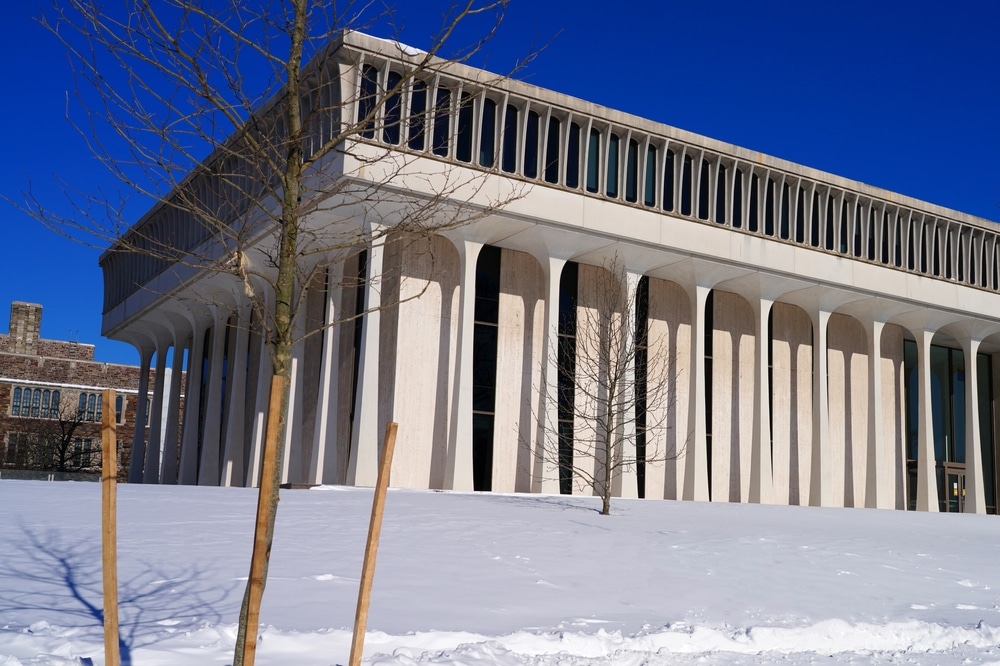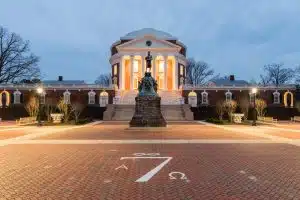Comparing Princeton and The University of Virginia
Choosing the right university can be a daunting task. With so many factors to consider, it can be overwhelming to make a decision. In this article, we will be comparing Princeton and the University of Virginia in-depth, analyzing the various aspects. This includes campus life to research opportunities. By the end of this article, you will have a clear understanding of which university may be right for you.
Location and Campus: Comparing the Campus Lifestyles of Princeton and University of Virginia
Princeton is located in Princeton, New Jersey while the University of Virginia (UVA) is situated in Charlottesville, Virginia. Princeton’s campus is smaller, spanning over 500 acres, while UVA’s campus is more extensive, covering over 1,682 acres.
Both universities have a picturesque charm with Princeton’s neo-gothic architecture and UVA’s Jeffersonian-style buildings. Princeton has a more intimate campus lifestyle with fewer students while UVA has a vibrant campus atmosphere with a larger student body. Overall, the location and campus style of each university are unique, and the ultimate choice depends on personal preferences.
One notable difference between the two campuses is the weather. Princeton experiences colder winters with an average temperature of 30°F, while UVA has milder winters with an average temperature of 40°F.
This difference in weather can impact the campus lifestyle, with Princeton students often staying indoors during the winter months, while UVA students can still enjoy outdoor activities.
Additionally, UVA’s location in the Blue Ridge Mountains provides students with access to hiking and other outdoor recreational activities, while Princeton’s location in central New Jersey offers proximity to major cities like New York and Philadelphia. Ultimately, the location and campus lifestyle of each university offer unique opportunities for students to explore and grow.
Academic Programs: Distinguishing the Academic Offerings of Princeton and University of Virginia
Both universities offer a diverse range of academic programs. Princeton offers undergraduate degrees in the arts and sciences, engineering, and more.
The university also offers graduate programs in various fields, including public affairs, engineering, and social sciences. UVA also offers undergraduate degrees in several areas, including liberal arts, engineering, and business, and has several graduate programs.
However, UVA has a law school, which is absent in Princeton. Students who are interested in pursuing law as a career may lean towards UVA. Overall, both universities have notable academic programs, and the choice depends on your area of study.
It is worth noting that both Princeton and UVA have unique academic programs that set them apart from each other. For example, Princeton has a renowned program in the field of astrophysics, which includes research opportunities at the Princeton Plasma Physics Laboratory.
On the other hand, UVA has a highly regarded program in the field of psychology, with a focus on clinical and experimental psychology. Additionally, UVA offers a program in global development studies, which combines coursework in economics, politics, and sociology to address global challenges. These specialized programs may be a deciding factor for students who have a specific academic interest.
Admission Requirements: Understanding the Different Admissions Processes for Princeton and the University of Virginia
To gain admission to Princeton, applicants have to complete the Common Application, including essays and standardized test scores. Additionally, they must submit their high school transcripts and two teacher recommendations.
Princeton also offers a single-choice early decision option, which requires applicants to submit their applications by November 1st and receive their admission decisions by mid-December.
UVA’s University office of admission reviews application materials holistically, and the admission process is not solely reliant on standardized tests.
While the Common Application is used as well, UVA also has its essay requirements to complete, and two teacher recommendations are required. The admission rate for both universities is competitive, given the number of applicants each year.
It is important to note that both Princeton and UVA also consider extracurricular activities, community involvement, and leadership experience when reviewing applications.
Princeton values a student’s intellectual curiosity and academic achievements, while UVA looks for students who demonstrate a commitment to service and a desire to make a positive impact in their communities.
Both universities also offer need-based financial aid to eligible students, and UVA has a program that guarantees full financial aid to students from low-income families.
Student Life: A Comprehensive Look at the Extracurricular Activities at Princeton and University of Virginia
Princeton has over 300 student clubs and organizations, ranging from academic to cultural to athletic to community service-oriented. UVA also has a wide variety of student organizations, with over 800 student-run clubs.
Both universities offer robust extracurricular programs that cater to a diverse range of interests. Princeton has a stronger focus on research, while UVA has a more extensive Greek life community. Students interested in research pursuits may lean towards Princeton, while those looking for a more active social life may prefer UVA.
Aside from the numerous student organizations, both Princeton and UVA offer a range of intramural and club sports. Princeton has a strong tradition of varsity athletics, with 37 varsity teams competing in the Ivy League.
UVA also has a strong athletic program, with 27 varsity teams competing in the Atlantic Coast Conference. In addition, both universities have state-of-the-art fitness centers and facilities for students to use.
Furthermore, both universities have a thriving arts scene, with opportunities for students to participate in theater productions, music ensembles, and visual arts organizations.
Princeton has a renowned art museum on campus, while UVA has a student-run arts organization that hosts events and exhibitions throughout the year. Students interested in pursuing the arts will find ample opportunities at both universities.
Athletics: Comparing the Athletic Programs at Princeton and University of Virginia
Princeton is a member of NCAA Division 1 and the Ivy League, fields a total of 38 varsity teams, and has won numerous championships throughout the years.
UVA also competes at the NCAA Division 1 level but is a member of the Atlantic Coast Conference (ACC), home to competitive sports programs such as basketball and football.
UVA has won twenty-five national championships, including six NCAA men’s basketball titles. Both universities have notable athletic programs, but the choice depends on individual interests.
Princeton’s athletic program has a strong focus on individual sports such as track and field, swimming, and tennis. The university has produced numerous Olympic athletes, including gold medalist rower Caroline Lind.
Additionally, Princeton’s football team has a long-standing rivalry with Harvard, known as “The Game,” which is one of the oldest and most storied rivalries in college football.
On the other hand, UVA’s athletic program has a strong emphasis on team sports such as basketball, soccer, and lacrosse. The men’s lacrosse team has won seven national championships, while the women’s soccer team has won four. UVA also has a strong tradition of producing successful professional athletes, including NFL players Chris Long and Tiki Barber.
Faculty: Examining the Faculty Profiles at Princeton and University of Virginia
Both universities have renowned faculty members who are experts in their fields. Princeton has a relatively smaller faculty who are involved in teaching and cutting-edge research.
UVA has a larger faculty body and emphasizes the teacher-scholar model. Both universities have a strong emphasis on undergraduate teaching and research opportunities for students.
Students should examine the faculty profiles and research interests of both universities to determine which university aligns better with their academic interests.
It is worth noting that both Princeton and UVA have faculty members who have received numerous awards and recognitions for their contributions to their respective fields.
For example, Princeton’s faculty includes several Nobel laureates, while UVA’s faculty includes members of the National Academy of Sciences and the American Academy of Arts and Sciences.
These accolades not only reflect the high caliber of the faculty at both universities, but also provide students with unique opportunities to learn from and work alongside some of the most accomplished scholars in the world.
Alumni Network: Analyzing the Impact of Alumni Networks on Career Opportunities for Graduates from Princeton and University of Virginia
Both universities have notable and active alumni networks that offer comprehensive programs for professional and personal growth. Princeton’s alumni network is strong and has graduates spread all over the country and the world.
UVA’s alumni network is prominent and active, and the university has attracted influential personalities such as former U.S. Presidents Woodrow Wilson and Thomas Jefferson.
Both universities’ alumni networks offer numerous opportunities for networking, mentoring, and career advancement. However, it should be noted that each university has alumni networks that are stronger in certain fields and industries.
For example, Princeton’s alumni network is particularly strong in finance and technology, with many graduates holding high-level positions in companies such as Goldman Sachs and Google.
On the other hand, UVA’s alumni network has a strong presence in politics and law, with many graduates holding positions in government and prestigious law firms.
It is important for graduates to research and connect with alumni in their desired field to fully take advantage of the opportunities offered by their university’s alumni network.
Scholarships & Financial Aid: Understanding the Financial Aid Options Available to Students Applying to Princeton or University of Virginia
Both Princeton and UVA have extensive financial aid programs. Princeton is Need-blind, meaning that they consider applicants without evaluating their financial need in mind.
At the same time, UVA operates on a need-blind basis for residents of Virginia and on a need-aware basis for out-of-state students. Both universities have merit and need-based scholarships for eligible students.
Students should apply for financial aid as early as possible and compare the financial aid options offered by both universities before finalizing their decision.
It is important to note that the financial aid packages offered by both universities may differ based on a student’s individual circumstances.
For example, a student with a higher family income may receive less financial aid than a student with a lower family income. Additionally, some scholarships may have specific eligibility criteria, such as academic achievement or community involvement.
Students should also be aware of the different types of financial aid available, such as grants, loans, and work-study programs. While grants and scholarships do not need to be repaid, loans do accrue interest and must be paid back after graduation. Work-study programs allow students to earn money through part-time jobs on campus to help cover their expenses.
Student Diversity: Assessing the Diversity Profiles of Students Studying at Princeton and the University of Virginia
Both universities have a diverse student body, with students from various ethnic, racial, and socio-economic backgrounds. In terms of the gender ratio, Princeton has a nearly equal split in terms of gender, while UVA’s female population is slightly higher than its male population.
Princeton has a student population that is predominantly white, whereas UVA has a diverse student population, including Asian, Black, Hispanic and Latinx, and Native American students. Both universities have programs and initiatives that promote diversity, equity, and inclusion on campus.
It is worth noting that both universities have made efforts to increase diversity among their student populations in recent years. Princeton has implemented a need-blind admission policy, which means that a student’s ability to pay for tuition is not a factor in the admission decision.
This policy has helped to increase the number of low-income and first-generation college students at the university. UVA has also taken steps to increase diversity, including the establishment of a scholarship program for underrepresented minority students and the creation of a diversity task force to address issues related to diversity and inclusion on campus.
Research Opportunities: Comparing Research Opportunities Available to Graduate Students at Both Institutions
Princeton and UVA both offer extensive opportunities for research for graduate students. Princeton has research centers and institutes that focus on various fields, including computer science, neuroscience, and global health.
UVA has a robust research program with an emphasis on interdisciplinary work. Both universities offer graduate students opportunities to work with renowned faculty members and to publish research findings.
Graduate students should consider the research opportunities offered by both universities and determine which aligns better with their research interests.
Additionally, Princeton offers graduate students the opportunity to participate in research projects with industry partners, providing real-world experience and potential job opportunities after graduation.
UVA, on the other hand, has a strong focus on community-engaged research, allowing graduate students to work on projects that have a direct impact on the local community.
Furthermore, both universities have extensive resources for funding research projects, including grants and fellowships. Princeton offers the Graduate School Research Funding program, which provides funding for research-related expenses such as travel and equipment.
UVA has the Graduate School of Arts and Sciences Fellowship program, which provides financial support for graduate students conducting research in their field of study.
Choosing Between Princeton or University of Virginia: Tips for Making Your Final Decision on Which School Is Right for You
Choosing between Princeton or UVA involves evaluating many factors, including academics, location, extracurricular activities, student life, athletics, and financial aid. Students should consider the individual programs, faculty, and research opportunities, as well as their preferences for campus style and size, and involvement in extracurricular activities.
Above all, it is essential to make an informed decision based on personal circumstances and the available resources. Conducting thorough research and making campus visits can also be helpful in making the final decision on which university is right for you.
In conclusion, both Princeton and UVA offer excellent academic programs, robust faculties, and extensive extracurricular opportunities for students.
By comparing the various factors, including location, cost, student life, athletics, faculty, alumni networks, research opportunities, rankings, and reputation, prospective students can make an informed decision on which university is a better fit for them.
Segue to AdmissionSight
At AdmissionSight, we firmly uphold the conviction that every student is entitled to the chance to pursue their dreams at their preferred college. Our mission is to equip you with the expert advice and unwavering support you need to secure a place at the schools you aspire to attend.
Don’t let your future hinge on uncertainty. Reach out to AdmissionSight today to arrange a complimentary consultation and embark on the journey toward realizing your dreams. With our expert mentorship and steadfast support, the sky’s the limit.









































